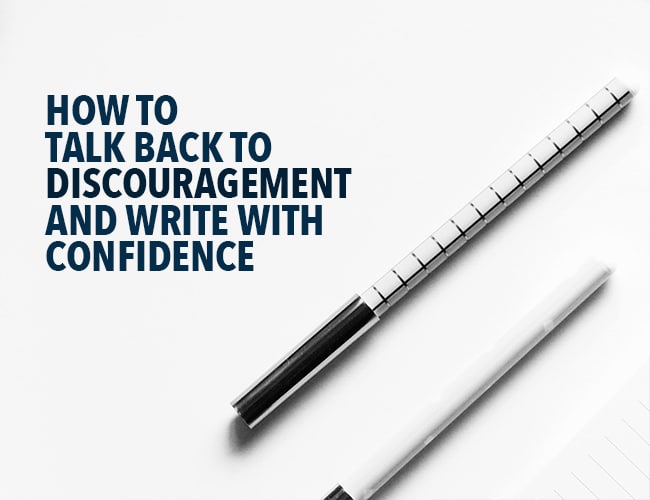Three times this week I have come across encouragement from writers who wrote, edited, and published books at the margins of their lives, and writers who overcame incredible odds to get their stories into the world. It reminded me that we all face some kind of resistance or obstacle in pursuing creative work. Too many times, I let discouragement keep me from making progress. I wondered how to write confidently instead, beating back the discouragement that stops me from writing.

How do we counter our discouragement and get our message out?
The Battle of Discouragement
A couple stories came across my Twitter feed this week that were inspiring, such as the romance novelist who wrote books in a tire store waiting for tire and oil changes.
Two days later, Karen McManus (One of Us is Lying) tweeted about how she wrote her book at night after a full day working and parenting solo full time. YA novelist Jeff Zentner (The Serpent King, Goodbye Days) tweeted out that he still works a 9-5 and writes on his phone during his bus commute.
It reminded me that when we want something enough, we make space for it both in our schedules and our minds.
This is nothing new, but I needed a reminder this week as I have found myself struggling to finish a fiction manuscript this spring. Each time I sit down to work on it, I pound out a couple hundred words and find myself discouraged that something isn’t working, that it isn’t what I envisioned, that it feels like it will never be finished.
Too often, I’ve made the critical mistake of listening to the discouragement inside my head, and I find myself switching to write something else or do the laundry (you know it’s desperate when I’m doing laundry!).
When I focus on why I can’t write (crazy work or family schedules, managing health problems, a dead laptop), I quickly drown in discouraging thoughts that drain my energy and resolve. I have to remember to talk back to that discouragement and keep writing. Here are a few of the ways I talk back to discouragement.
When discouragement says, “You don’t have time.”
This statement used to be a major block for me, until I accepted that I have the same amount of time as everyone else in the world. I don’t need more time; I need more intention. Yes, it feels like I have less time when I have a family or health crisis or when things at work eat up weekends, but if writing is a priority, then I have to make time for it.
I talk back to this statement by saying, “Maybe, but I’m going to write a little anyway.” Just like the author who wrote her book in the tire store, we have time. It’s just not where we think it is. Reclaim those moments when you are waiting. You’ll be surprised how much writing you can get done in ten minute snatches of time.
When discouragement says, “This isn’t good.”
I’m fighting this voice right now. Quickest response to this critical statement is to add the word “Yet.” This chapter might not be good YET, but I can fix it in revision. This character isn’t good YET, but I can develop her further.
Perfectionism is a great paralyzer. Don’t let the quest for perfection or some ephemeral greatness discourage you from getting words on the page. This isn’t lowering your standards — it is recognizing that all writing and creative work is a process. Embrace it.
When discouragement says, “You’re not a writer.”
Best response to this inner critic is not a statement, but an action. Stop thinking about writing, studying writing, talking about writing, and write. If you wrote even one sentence on your project today, tell that voice of discouragement to stuff it, because you are writer.
How to Write Confidently
If you are a discouraged writer today, I hope you’ll realize you aren’t alone. Let yourself off the hook. Quit mentally bashing yourself for what you have or haven’t done and just get back to stringing together sentences. That's how to write confidently: don't expect perfection; just put words on the page and write!
What do you do to talk back to discouragement? Share your best tips in the comments.
PRACTICE
Set a timer for fifteen minutes. Create a scene where a character fights discouragement. Discouragement can take the form of an internal conflict or an external villain complete with tights and a cape. Make the hero beat it! Then share your practice in the comments and encourage one another.
Sue Weems is a writer, teacher, and traveler with an advanced degree in (mostly fictional) revenge. When she’s not rationalizing her love for parentheses (and dramatic asides), she follows a sailor around the globe with their four children, two dogs, and an impossibly tall stack of books to read. You can read more of her writing tips on her website.



0 Comments